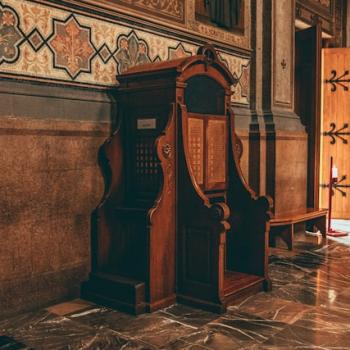
Current events in Christian pop culture show a lot about the Church. As Jesus said, you’ll know a tree by its fruit (Matthew 7:15).
Recently, there’s been a bit of a debate about a high-profile megachurch. Elevation Church is pastored by Steven Furtick in North Carolina, and was founded in 2006. Furtick has been the object of derision and polemic by other Christians. He was criticized on the American Gospel film (2018) for preaching what is known as the prosperity gospel, a distorted version of the gospel that prioritizes worldly comfort and wealth, rather than repentance, salvation, and redemption.
There have been other controversies surrounding Elevation and its senior pastor, but the most recent controversy was sparked over Elevation Church’s Easter invites.

Church Easter Invites without the Resurrection?
Pro Church Tools posted an article earlier in March about their conversation with Nicki Shearer, the Digital Content Creator for Elevation. In their conversation, Shearer revealed that their Easter invites intentionally excluded certain words to make invitations more appealing to non-Christians.
Here are Shearer’s words as quoted on the Pro Church Tools article.
For us, the most important thing on Easter is inviting people to church. This means reaching people far from God. So we’re not going to use the words “calvary,” “resurrection,” or the phrase “the blood of Jesus.” We won’t use language that will immediately make someone feel like an outsider.
These words were ill received. A post on the Evangelical Dark Web accuses Elevation’s choice of words as a bait and switch: “to bait people and hope to switch them with the gospel.” Protestia also posted an article, the title of which doesn’t hide their own attitude towards Elevation’s language choice (“Hint, It’s a Terrible Reason”).

Elevation’s Invites: Compromised or Conversational?
The focus of our discussion as we unpack the issue here is whether Elevation Church’s Easter invites are compromised or conversational. Is Elevation diluting the meaning of Easter by removing words like “calvary” or “Easter,” or are they trying to reach people who don’t quite know what Easter is about?
To state from the start, I believe that Elevation is doing the latter, even if in a disagreeable way. They are trying to be conversational, and being conversational is not the same thing as being compromised. Later on in the article, I will argue how exactly Elevation is trying to be conversational, and why this effort reflects changing realities in the American public that Christians should be aware of.
But for now, is Elevation’s choice of language a compromise? Easter is, after all, all about the resurrection. But how can invitations to an Easter service not mention the resurrection? (There are those who make the unsupported claim that Easter is a pagan holiday; see Inspiring Philosophy’s video on this, as he does a good job unpacking the question of Easter’s pagan roots.)
Not a Compromise
But Elevation Church’s Easter invites do not seem to be compromised. We should acknowledge that while Elevation Church’s Easter invites have more ‘neutral’ language, their website does not. And their services mention the resurrection. So this puts this whole controversy in perspective.
The language choice in the invitations, and not the language choice on their websites or services, were all it took for Elevation to get bashed for compromising the faith. But is that really a fair accusation?
Invitations, as we know, are not Gospel tracts, nor are they theological treatises. In fact, I’m sure many of our churches would be content with sending out Easter service invites to people that simply say, “Join us for Easter!” Or are we only satisfied with Easter invitations that give full accounts of 2,000 years of Church teaching on Pascha and resurrection?
Therefore (and I acknowledge my quick pace in this argument), it is okay for the invitations to be neutral; invitations should be welcoming. They should be conversational.

The Need for Being Conversational
Conversations are an important part of Christian life. They are an important part of Christian political life. We as a faith community have no public and outward facing life in our cities aside from our conversations and engagement with others who do not share our faith commitments.
But how can there be conversation when we are not willing to speak each other’s language? Christians have a code that we speak (and even then, different kinds of Christians have different codes). We talk in a way that is unique to us.
And it is important to remember that we as a faith community are a subculture. Surrounding us are people who may not know the meanings of the words that we use, even the words that mean the most to us. But sometimes we assume that when we say a Christian thing, everyone will understand what we mean. But this just isn’t the case.
Let’s take an example. Say that you’re a run-of-the-mill evangelical Christian. If a Greek Orthodox Christian walked up to you and asked you about the pantocrator, you might not know what she’s talking about. But the pantocrator is Jesus! It’s one of His names: the ruler over all. It is a word that speaks in a deep way to Christ’s reign and power, and not just His mercy.
Another analogy is with generational slang. Baby boomers don’t tend to be too in touch with millennial slang, nor do millennials always keep up with Gen Z slang. The same is true for communities differentiated by religion. The words that we use can become a sort of “slang” that only we know the definitions and deeper meanings to.
Different Signs, Same Meaning
To be conversational sometimes means speaking in terms that people are familiar with. Because let’s face it, though the narratives of secularization (the theory that religion declines as societies modernize) and a post-Christian West (the notion that Western countries are de-Christianizing) don’t hold up sociologically, the broader American public is becoming increasingly unfamiliar with Christianity.
You can see this in street preacher videos. When I had my Dorre Love and David Lynn phases, I remember listening to the conversations that these preachers and others would have. The street preachers would ask their audience basic questions about the Bible, like the names of the Gospels, or who Jesus is. It was very common for people to either get those answers wrong, or to have no answer at all.
When we speak Christian language, we don’t realize it, but we can become unintelligible to the people we are trying to communicate with. Now, words like “resurrection” might still be familiar for many Americans. But words like “reincarnation” might soon become more well-known. “Easter” itself is becoming a disputed word, as Christians divide over whether to call that holiday “Easter” or “Resurrection Sunday,” as misinformation spreads online that Easter is a pagan holiday.
The answer? We should develop the skills to communicate our faith in ways that people understand. In ways that really do invite people. We should be able to talk about Easter in a way that speaks to the universal human concern with death, and how Jesus is somehow the solution to that concern. And as the conversation unfolds, we can begin to share more about what Easter means, and why the resurrection is so central to the Christian faith.
It Takes Time!
The biggest issue that people have with strategies like Elevation’s is that we want to evangelize now. We want to win souls now. And that is one of the many signs of how we have let our love for instant gratification affect our Christian walk.
Yes, we should reach out to others. But this outreach should be done wisely. Will a soul be saved if a preacher reads the Bible in Latin to them? Maybe. All things are possible with God, right? But on our end as human beings trying to share God with other human beings, we have no other choice but to do so ashuman beings.
So let the process be a process. People don’t need to understand Easter and the resurrection all at once. Understanding rarely happens in an instant. If we want to share holidays like Easter, we should walk others through what those holidays mean. Talking at people just doesn’t work the same as walking with them.
Isn’t it the same thing with the Gospel? Yelling “Jesus saves!” at a crowd might attract a couple of souls. But at the end of the day, understanding the Gospel and coming to know Christ takes time. It sure did for me, and I was born into the Church.
Lessons for Political Life
In political life, it is very important to understand how we are perceived by people who are different than us. This includes how they relate to the words that we use.
Speaking in Christian words can be counterproductive when others aren’t immersed in our language. Words like “gospel” or “grace” are either meaningless or bland to many non-Christians, at no fault of their own. But this difference that leads to beautiful opportunities.
It is a blessing that different communities have different codes and ways of speaking. To reach someone in another community, a relationship must be built. We cannot coerce each other. We cannot yell or protest until “the other side” switches teams. No, we must build relationships to really understand their ways of speaking and acting. And hopefully, those in other communities might also understand us.

Political life has so much potential for connection-making. The Left uses terminologies that the Right doesn’t use. Conservatives think in ways that liberals do not. Religious people act in ways that nonreligious people do not, and different religions speak in different ways. That is the reality that we live in. The question is not, will we live in light of that reality? Reality doesn’t care how we live. But God does. And so the question is, how can we approach that reality in ways that help us love God and love our neighbors?
The answers to that question will take a lot more than looking at Elevation Church’s Easter invites. But hopefully those invites help us start thinking about how we enter into conversation and invitation with others.













